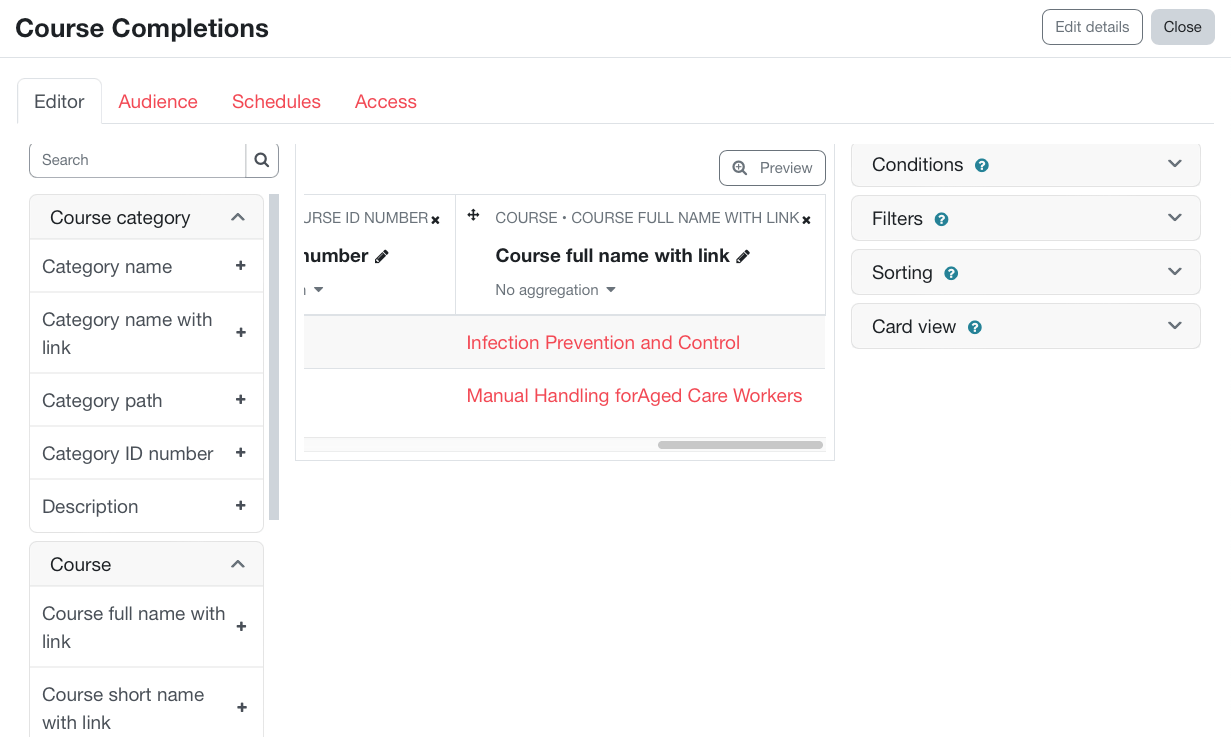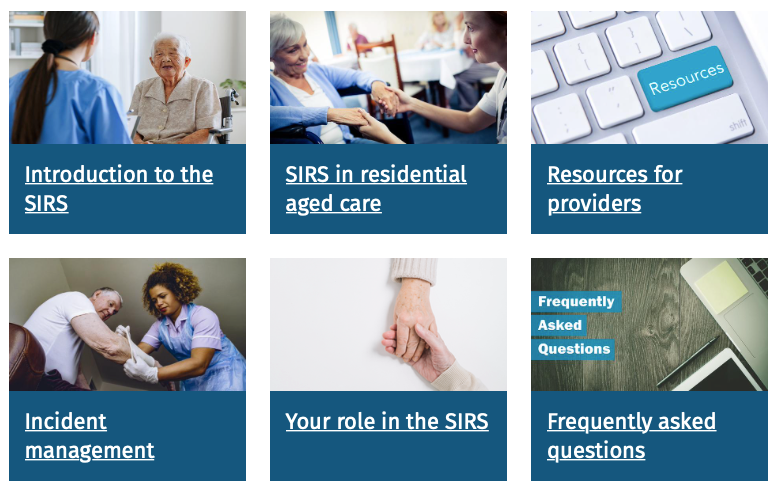As the aged care industry continues to grow, it’s essential to find efficient ways of managing operations. One way to achieve this is by incorporating a Learning Management System (LMS) into your business. An LMS can revolutionize how you train your staff and improve overall productivity. In this article, we’ll explore how an LMS can benefit aged care businesses, what features to consider when choosing one, and why implementing an LMS could be the best decision for your organisation. So let’s dive in!
LMS in Residential Aged Care

Set up your organisation by site and role.
Create hot desks for learning or supply with tablets (can also be used to track competency via digital forms).
LMS in Community Aged Care

Set up your organisation by programs delivered. Use mobile learning app.
Table of Contents
How can an LMS be used in Aged Care?
Incorporating an LMS into your aged care business has numerous benefits that will enhance operational efficiency and provide better outcomes for residents’ wellbeing.
An LMS can be used in a variety of ways in the aged care industry:
- An LMS can provide staff with access to online training modules that cover essential topics such as infection control (see example below) and manual handling. These modules are especially useful for new employees who need to get up to speed quickly.
- An LMS can help manage compliance requirements by tracking staff certification and accreditation dates. This feature ensures that staff members remain up-to-date with mandatory training and qualifications.
- An LMS provides managers with real-time data on employee performance, enabling them to identify knowledge gaps or areas where additional support is required. Managers can then assign targeted training courses to improve their team’s skills.
- An LMS facilitates communication between management and front-line workers by providing a central hub for sharing information such as policy updates or procedural changes or for rapid change of business (e.g. during covid outbreak).
LMS in Aged Care for providing Essential training e.g. infection control
Here is a visual of an Infection Control Hub in Moodle / Totara LMS using free eLearning supplied by VICNISS .

VICNISS can supply the eLearning packages in SCORM format; in return all they ask for is number of staff that have completed the said modules.
Mandatory training for aged care workers using an LMS
Mandatory training for aged care workers is possible through the use of a Learning Management System (LMS) such as Totara or Moodle. An LMS can be used to provide courses, assessments, and other resources that are designed to help ensure that all staff in an aged care facility have the necessary knowledge and skills to deliver quality care. The system can also track progress and provide certificates or other awards upon successful completion of the course. This type of training is particularly important in ensuring that all staff have a good understanding of best practices and regulations related to providing care for older adults.

The benefits of using an LMS in Aged Care
Implementing a learning management system (LMS) in aged care facilities can bring numerous benefits to the organisation. One of the main advantages is that it enables staff members to access training materials at any time and from anywhere, which ensures that they are always up-to-date with their knowledge and skills.
By using an LMS, employees can take part in online courses that are specifically designed for aged care topics such as dementia care, fall prevention, infection control, medication management and much more. These courses not only enhance their professional development but also contribute significantly towards improving patient outcomes.
Another benefit of implementing an LMS is its ability to track employee progress through data analytics. This feature helps identify areas where employees may need additional support or refresher training while providing managers with evidence-based insights into staff performance.
Moreover, an LMS helps reduce costs associated with traditional classroom-based training methods such as travel expenses and venue hire fees. It also minimises downtime during staff training sessions since employees can complete modules at their own pace without being taken away from their daily duties.
Implementing an LMS in aged care facilities has numerous benefits for both the organisation and its employees. By providing accessible online training material on specific topics related to elderly care along with tracking employee progress through data analytics will help improve patient outcomes while reducing costs associated with traditional classroom-based trainings.

LMS for compliance training in aged care
How to choose the right LMS for your Aged Care business
Choosing the right Learning Management System (LMS) for your Aged Care business is crucial to ensuring that your staff members receive quality training and can provide excellent care to elderly residents. Here are some factors to consider when selecting an LMS:
- Content Management: Look for an LMS that allows you to easily manage, upload, and track content such as policies, procedures, and training materials.
- User-Friendly Interface: Consider choosing an LMS with a user-friendly interface that is easy for your staff members to navigate.
- Customisation Options: Choose an LMS platform that offers customisation options so you can tailor it according to the specific needs of your organisation.
- Reporting Capabilities: Ensure that the system has robust reporting capabilities so you can monitor staff progress and identify areas where additional training may be needed.
- Mobile Compatibility: In today’s fast-paced world, having mobile compatibility is essential since many employees access their work-related applications from mobile devices.
By considering these factors when selecting an LMS platform for Aged Care businesses, you will be able to choose one that meets all of your requirements and helps improve employee performance while providing better care services to elderly residents.
Customise the LMS to suit your Aged Care needs
Whilst I have worked with multiple Learning Management Systems, none of them look or work the way your sector needs; that is where I can work with your Learning & development team to customise it your needs.
Things that make the LMS part of your HR suite:
- Integration with your HR information systems; a cheaper alternative is to use csv to create and update users in bulk (export from your HR system and import into the LMS daily via a sync or manually after reformatting the data).
- Branded to your aged care business –
- look and feel e.g. stying emails to brand
- language customisation (e.g. Totara uses the term ‘certification’ to refer to one or more courses that are repeated; you probably wish to refer to them as ‘recurring mandatory programs’, I can help you modify the language used)
- Flow – Integration with your intranet – make it part of your culture, allow seamless flow between your intranet (SharePoint) and the LMS. For example, use digital forms built in SharePoint to capture Hand Hygiene competency, then have a regular upload of data to LMS where the hand hygiene certification ensures that all of your staff remain compliant.
- Create role specific help guides to explain how each role can use the LMS to its optimum – e.g. guide for Learners (Home Care Workers), Set Managers (admins) and Trainers/Care Managers.
- Create role specific dashboards – encourage completion of mandatory learning and self motivated learning

Create custom reports and dashboards
Frequently Asked Questions
Mandatory training is a requirement that employees must attend and complete in order to remain employed and be eligible for certain jobs. It covers topics such as health and safety, HR policies, and regulations. An LMS (Learning Management System) can help manage mandatory training by tracking which courses have been completed, assigning courses to individuals or groups, providing feedback on course completion, keeping records of courses completed and ensuring that the training is up to date. Additionally, an LMS can provide real-time reporting so managers can track employee progress. This is especially important for aged care workers who may require regular refresher training on topics such as privacy policies and first aid protocols.
Yes, it is possible to use an LMS to roll out aged care quality standards training. An LMS can be used to develop online courses and track learner progress, as well as provide reporting and analytics on the effectiveness of the training program.
An LMS can be a valuable tool for Aged Care businesses in managing mandatory training and ensuring staff have the necessary knowledge and skills to provide quality care. It can also help with ongoing professional development and keeping up with industry standards.
When choosing an LMS for your Aged Care business, consider factors such as ease of use, reporting capabilities, integration options with other systems, and customer support.
Remember that while an LMS can assist in training and education efforts, it is still important to prioritize hands-on experience and practical application of skills when providing care to older adults. By combining technology with a human touch, we can work towards improving the lives of those in our ageing population.

Implementing an LMS in aged care can bring numerous benefits such as efficient mandatory training, cost savings and improved quality of care. When choosing an LMS for your aged care business, it is important to consider factors like ease of use, security features and customer support. Additionally, using an LMS to provide online learning can enhance the accessibility and flexibility of education for both staff and residents.
As the demand for skilled professionals in aged care continues to grow, utilizing technology like an LMS will become increasingly necessary. By investing in the right LMS platform and offering comprehensive training opportunities through this system, you can empower your workforce with the skills they need to deliver exceptional care while staying compliant with regulations. Start exploring your options today!
An LMS can be a game-changer for the Aged Care industry. With its ability to streamline mandatory training and offer online learning opportunities, it can significantly improve the quality of care provided to seniors. By choosing the right LMS that fits your business needs, you can empower your staff with knowledge and skills that will help them deliver better outcomes for residents.
Although there is no denying the significant benefits of using an LMS in aged care sectors, face-to-face or classroom training shouldn’t be neglected. It’s essential to maintain a balance between both types of learning methods as they complement each other. An ideal approach would be blending e-learning and traditional classroom training together.
Use Seminar and Attendance modules in Moodle or Totara to allow users to sign up to events, automate notifications (via email) and calendar reminders to ensure your workers attend training; track completion of such training and mark of course completions.
Wrap your courses in Programs and Certifications (Totara) to ensure that compulsory learning is completed on time.
Incorporating an LMS into aged care businesses can enhance employee productivity while ensuring compliance with mandatory training requirements. Don’t hesitate; start exploring different options available in the market today!

Implementing an LMS in aged care can significantly improve the quality of care and streamline mandatory training for your staff. From providing online learning modules to tracking competencies, an LMS can help ensure that your staff is knowledgeable, competent, and up-to-date with industry standards. When choosing the right LMS for your business, be sure to consider its features and capabilities carefully. With the right tools at hand, you can provide high-quality care to aging individuals while maintaining a skilled and efficient workforce. And with an increasing demand for aged care services across the globe now more than ever before, there’s never been a better time to invest in an LMS for aged care.
Use tools like SharePoint digital forms, OJT (On the Job Training modules) or Assignment Activities to keep track of your competency assessments.
As the aged care industry continues to grow and evolve, it is crucial that workers keep up with the changes and developments in the field. One way to achieve this is through professional development using a learning management system (LMS) specifically designed for aged care. There are both pros and cons to utilizing an LMS for aged care workers’ professional development.
On the one hand, an LMS allows workers to access training materials at any time, from any location with internet access. This makes it easier for workers to fit their professional development into their busy schedules and eliminates the need for costly and time-consuming face-to-face training sessions. Additionally, an LMS can provide personalized learning experiences to workers by allowing them to choose the courses and training modules that are most relevant to their job roles and career goals. It also enables them to track their progress and receive feedback in real-time, enabling them to make adjustments to their learning methods accordingly. This ensures that workers are able to stay current with the latest developments and changes in the industry.
On the other hand, there are some cons to utilizing an LMS for aged care workers’ professional development. Firstly, there is a risk that workers may feel isolated and lack the interaction that they would receive in face-to-face training sessions. This could have a negative impact on their learning experience and may lead to disengagement and decreased motivation. Additionally, an LMS requires a degree of self-directedness and self-motivation, and not all workers may have the ability or willingness to take on this responsibility. Finally, there is the potential for technical issues to arise, such as problems with internet connectivity or software malfunctions, which could impede workers’ ability to access and complete training modules.
Despite these potential limitations, the overall benefits of using an LMS for aged care workers’ professional development likely outweigh the drawbacks. With the right support and resources, aged care workers can use an LMS to enhance their skills, knowledge, and practical abilities, enabling them to provide high-quality, person-centred care to their clients.
Free training can be linked to 3 ways:
- In some instances, you may find that the organisation providing the training is willing to share the SCORM package; this makes it easy for learners to complete the free training on your LMS and for you to report on completions. For example, LMS in Aged Care – infection control (VICNISS) and Difficult conversations in the workplace – employee course by FairWork Australia
- In other instances you can incorporate content from external site Learning Tools Interoperability (LTI) e.g. several eLearning providers
- In other situations where the organisation is providing free training but is not willing to share the packages or allow connecting to your LMS, then create a simple process for learners to launch said training, download completion certificates and upload the same to your LMS to mark themselves completed. e.g. Worker Training Modules by NDIS Quality and Safeguards Commission.
One of the key benefits of using an LMS for hosting or linking to training courses is that it enables providers to monitor and track their employees’ progress. LMS platforms can generate reports that show who has completed which courses and how well they have performed. This makes it easier for managers to identify areas of strength and weakness among their staff and address any performance issues as they arise.
Another advantage of using an LMS for aged care training is that it can be more cost-effective than traditional training methods. With an LMS, providers can deliver training to large groups of employees simultaneously, without the need to hire external trainers or book training venues. This can help to reduce costs associated with staff training without sacrificing the quality or effectiveness of the training.
In conclusion, an LMS for aged care can be an effective way to host or link to free training programs for aged care workers. By using an LMS, providers can ensure that their employees receive consistent and engaging training that is easy to access and track. Furthermore, using an LMS can help to reduce costs associated with traditional training methods, making it a more cost-effective solution for training in the aged care sector.
rkers. With the increase in healthcare needs of elderlies, the demand for aged care workers has increased exponentially. However, the nature of the job typically requires aged care workers to assist and handle the elderly in a manner that can jeopardize both parties’ safety. Therefore, it is crucial to provide aged care workers with adequate training in Manual Handling to ensure they can safely handle the elderly.
Manual handling training can be provided and assessed in multiple formats:
- online learning and quizzes (for administrative staff in your aged care home) – use SCORM package and quizzes
- face to face workshops for your health care workers – track attendance using the Seminar module in Totara
- assess competency using OJT (on the job training) or digital checklists
An LMS can alleviate the challenges faced while training aged care workers on Manual Handling. An LMS can provide aged care workers with an interactive and engaging virtual learning experience, and it makes learning accessible to the aged care workers at their convenience. This system can offer various courses with multimedia content, simulations, quizzes, and assessments, providing a cost-effective and interactive approach to Manual Handling training. This method of training can ensure that aged care workers develop skills and knowledge in Manual Handling that translate into practice, reducing the potential for injuries.
Moreover, an LMS for aged care can ensure that all aged care workers receive consistent training, irrespective of their geographical location or the hours worked. The platform can deliver training to all of the aged care workers in the organization, simultaneously ensuring that everyone receives the same up-to-date training. The training can be customized to suit different roles and situations, making it relevant and directly applicable to the learning needs of the aged care worker.
In conclusion, using an LMS for Manual Handling training in aged care can be a game-changer for caregivers and healthcare providers. With its interactive and flexible approach, an LMS offers a cost-effective and safe way of training healthcare providers in Manual Handling. This platform can ensure that aged care workers receive consistent training, making it a scalable solution to the Manual Handling challenges within aged care. Therefore, investing in an LMS for aged care can improve the wellbeing of the elderly and aged care workers’ safety, making it a worthy investment for all stakeholders.
Learning Management Systems (LMS) are becoming an essential tool in the healthcare industry, as they provide an effective platform for mandatory training for nurses and healthcare workers. These systems enhance the training process by providing access to up-to-date information, supporting flexible learning, and allowing for effective tracking of progress and compliance. Consequently, an LMS can be used to provide mandatory training in areas such as infection control, patient handling and care, medication management, and workplace health and safety.
One area where LMS can benefit is in aged care. These facilities require specialized training for their healthcare staff, and an LMS can provide a flexible, interactive, and tailored learning environment. For example, an LMS can provide optional training modules in nutrition and personal care for the elderly, which can enable the staff to provide better care to their residents. Moreover, the system can track employee progress, identify skill gaps, and provide targeted training.
However, using an LMS for mandatory training for nurses and healthcare workers requires careful consideration. For example, the technology should be user-friendly and accessible on different devices (use a mobile app, such as Totara Mobile to provide your learners with an experience optimised for small devices as well as allowing for downloading eLearning packages to allow completion when offline or in poor network) .

The content should be relevant, engaging and easy-to-understand by all participants. The system should also provide an alternative mode of learning in cases where classroom training is not possible, such as during the COVID-19 pandemic, where social distancing measures are in place.
Another critical factor is the effectiveness of the training provided. The healthcare sector requires a lot of practical experience, and an LMS should provide opportunities for practical demonstration and assessment of skills. Moreover, the system should also provide opportunities for feedback and assessment by both learners and trainers, which can permit for continuous improvement of the training program.
In conclusion, LMS is an effective tool for providing mandatory training for nurses and healthcare workers in the aged care sector. However, it requires careful consideration of the technology, content, and overall effectiveness. With the right use of LMS, healthcare workers can receive mandatory training that is flexible, interactive, and tailored to their specific needs. Moreover, the system can help improve the quality of care provided, leading to better health outcomes for patients and residents.
Dementia is a complex neurological disorder that affects a significant portion of the elderly population. Providing care and support to individuals with Dementia can be challenging, and as such, healthcare workers need to be equipped with the right skills and knowledge to handle the condition expertly. One of the most effective ways to achieve this goal is through the use of an LMS or Learning Management System. An LMS is a web-based platform that allows organizations to create, deliver, and manage their training programs online. This technology has proven to be particularly useful in the aged care sector, where staff members need to be trained on various aspects of care, including the management of Dementia.
You can build a Dementia Hub using Featured Links block in your Totara LMS that links to selected modules on an external site or host the same on your LMS .

Include links to accredited dementia courses and provide clear instructions on how your aged care workers can launch and complete the learning on DTA site and how they can claim CPD hours for the same.
An LMS can provide user-friendly tools and resources that healthcare workers can use to learn about Dementia and how to provide care to individuals with the condition. For instance, an LMS can have interactive modules that simulate real-life scenarios, allowing healthcare workers to practice their skills and decision-making abilities. The LMS can also offer educational videos, case studies, and self-paced quizzes that help reinforce the concepts learned. Additionally, an LMS can track the learners’ progress, generate reports, and provide administrators with valuable insights on how to improve the training program.
The benefits of using an LMS for dementia training go beyond just the convenience and interactivity it offers. It also ensures that healthcare workers are up to date with the latest developments in Dementia care and that they understand the regulations and policies governing their practice. This is crucial, considering Dementia is a progressive condition, and new research and findings are constantly emerging. By using an LMS, healthcare organizations can offer ongoing training to ensure that their staff members remain competent and confident in their practice.
In conclusion, an LMS is an excellent tool for providing Dementia training to healthcare workers in aged care. By leveraging the interactive and user-friendly features of the LMS, healthcare organizations can create comprehensive and engaging training programs that help their staff members develop the skills and knowledge needed to manage Dementia effectively. Moreover, the tracking and reporting tools of the LMS ensure that administrators can monitor progress and identify areas that require improvement, ultimately leading to better healthcare outcomes for individuals with Dementia.
Create a Serious Incident response Scheme (SIRS) Training Hub like this one

A Learning Management System (LMS) can absolutely be used to provide Serious Incident Response Scheme (SIRS) online training for healthcare workers. This is particularly true for the aged care sector, where SIRS training is critical to prevent and respond to incidents that can occur in a healthcare setting. Online training through an LMS can provide a convenient, flexible, and cost-effective way to deliver SIRS training, especially given the requirements for ongoing staff development within the aged care industry. Healthcare workers can access the training material from a variety of devices and platforms, at a time that is most convenient for them. LMS technology can also be used to track and record staff participation and progress, providing a level of accountability for workers and organizations. In addition, an LMS can also help streamline training processes, reducing the time and physical resources required to conduct in-person training sessions. Overall, using an LMS to deliver SIRS training to healthcare workers in aged care is highly beneficial for both the workers themselves and the organizations they work for. By ensuring that workers are trained on how to prevent and respond to serious incidents, aged care facilities can enhance the quality of care they provide, create a safer working environment, and minimize the risk of legal action or negative publicity associated with any incidents that may arise.
Conclusion
Implementing an LMS in your Aged Care business can bring about numerous benefits such as improved staff training and development, increased efficiency, streamlined communication and better compliance management.
When choosing the right LMS for your business, it is important to consider factors such as the features offered by the platform, its ease of use and compatibility with your existing systems. Make sure to do thorough research and take advantage of free trials before making a decision.
By investing in an LMS tailored to meet the unique needs of your Aged Care business, you can ensure that both your staff and residents receive top-quality care. With technology constantly evolving in this digital age, utilising tools like an LMS will only become more vital for staying ahead of competition while providing excellent service.

